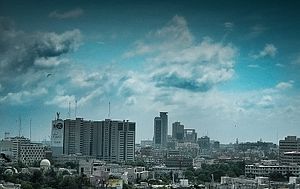Pakistan is on track. Against the backdrop of its long fight against terrorism over the past 15 years, Pakistan has achieved an economic milestone — gaining the status of an “emerging market” in MSCI’s latest review. MSCI will add Pakistan to the Emerging Market Index effective May 31, at the market close, with a weight of just 0.2 percent. Experts expect global funds to come pouring into Pakistan’s stock markets as a result.
The emerging market status is something unusual, as it was achieved in a crisis-ridden situation rather than under sustained political stability. Pakistan’s stock market has made history, giving a thrilling lesson to global investors and businesspeople who are wondering why money is flowing into this country despite upheaval, lack of stability, and other negative factors. Indeed, economic growth is stabilizing Pakistan’s political atmosphere in Karachi, Balochistan, and the Federally Administered Tribal Areas (FATA).
The upgrade puts Pakistan in good company. Other members of MSCI’s Emerging Markets Asia Index include China, India, Indonesia, Malaysia, the Philippines, South Korea, Taiwan, and Thailand. This shift will attract foreign investment into Pakistan. The chief reason behind Pakistan’s emerging status is China-funded loans and investments made under the umbrella of China-Pakistan Economic Corridor (CPEC), with Pakistan following pattern of Argentina and Vietnam.
CPEC, as the flagship of China’s Belt and Road project, helped rapidly convert Pakistan into an Asian “emerging market.” The settling of the balance of payments also helped Pakistan to achieve this status. According to Finance Minister Mohammad Ishaq Dar in his budget speech on May 26, Pakistan would become an “emerging market” effective June 1 on the basis of the performance of the Karachi Stock Market (KSE100), which emerged as the most profitable market in Asia last year.
Pakistan’s re-entry into the emerging market block after nine years was made possible by the country’s improving liquidity and growth. Pakistan lost this position in late 2008, following a period of market turmoil that halted trading for months in Karachi. Pakistan is the first country to get the frontier-to-emerging market promotion after Qatar and the United Arab Emirates several years ago.
This is Pakistan’s first step toward becoming an “Asian Tiger” and it was achieved with amazing speed, thanks to CPEC-driven optimism. The upgrade will likely lure a wider class of investors, thereby injecting huge amounts of money into the country. The outclass performances of Pakistan’s banking, energy, cement, oil and gas, and fertilizer sectors added to this performance and brought Pakistan into the limelight of stock markets around the world. Global X MSCI Pakistan ETF quadrupled in value last year, reaching US$48 million. In 2016, Pakistan’s KSE100 was the top-performing market in Asia, with 46 percent growth.
Other Asian giants like Japan, South Korea, Singapore, Thailand, and Malaysia have long resisted investing in Pakistan’s markets.Now the performance of the KSE100 has outclassed the rest of Asia and Pakistan has become an emerging market. If these countries continue to ignore the Pakistani market, it will clearly be for political reasons rather than market-driven sentiments.
Foreign direct investment (FDI) in Pakistan did not go beyond $1.7 billion in 2017. The performance of U.S. companies in Pakistan was outstanding but they invested less than in 2016. It was the same story for British, German, and Swiss companies as well as companies from the UAE and Saudi Arabia. Japan was a reluctant investor and has adopted a strong “wait and see” stance for over a decade, as has South Korea. Companies from Hong Kong did not follow in the footprints of China and also invested less in Pakistan, causing Prime Minister Nawaz Sharif to recently urge Hong Kong companies to invest more under CPEC. On the other hand, China has undertaken massive investments after 2011. The “emerging market” status would change this ongoing trend and attract more FDI.
Japan, South Korea, and other East Asian investors in particular need to overhaul their basic investment strategy toward Pakistan and reap the benefits. The market is offering lucrative benefits. The KSE100’s outperformance is likely to continue given Pakistan’s GDP growth, falling poverty, and burgeoning middle class. GDP growth has hit an all time high of 5.2 percent in the past decade.
Yes, isolated terrorist incidents will continue to have small-scale effects on the economic management, but they will not be major impact factors. Plus, unlike many East Asian economies, Pakistan’s market is virtually free of the impact of North Korean provocations. East Asian investors need to take these factors into account while investing in Pakistan as new frontiers are emerging under CPEC.
The prudent macro-economic management and fiscal discipline of the present government over the past four years and its CPEC-driven enthusiasm have led Pakistan to achieve its goal of regaining emerging market status. Pakistan must continue to strive to improve corporate governance to better its chances of becoming an Asian tiger. Efforts should be made at the bilateral and multilateral level to convince investors from East Asia, Europe, North America, and Oceania to investment in Pakistan.
Dr. Ahmad Rashid Malik is Director of the China-Pakistan Study Center at the Institute of Strategic Studies Islamabad. He writes on East Asian affairs.
































